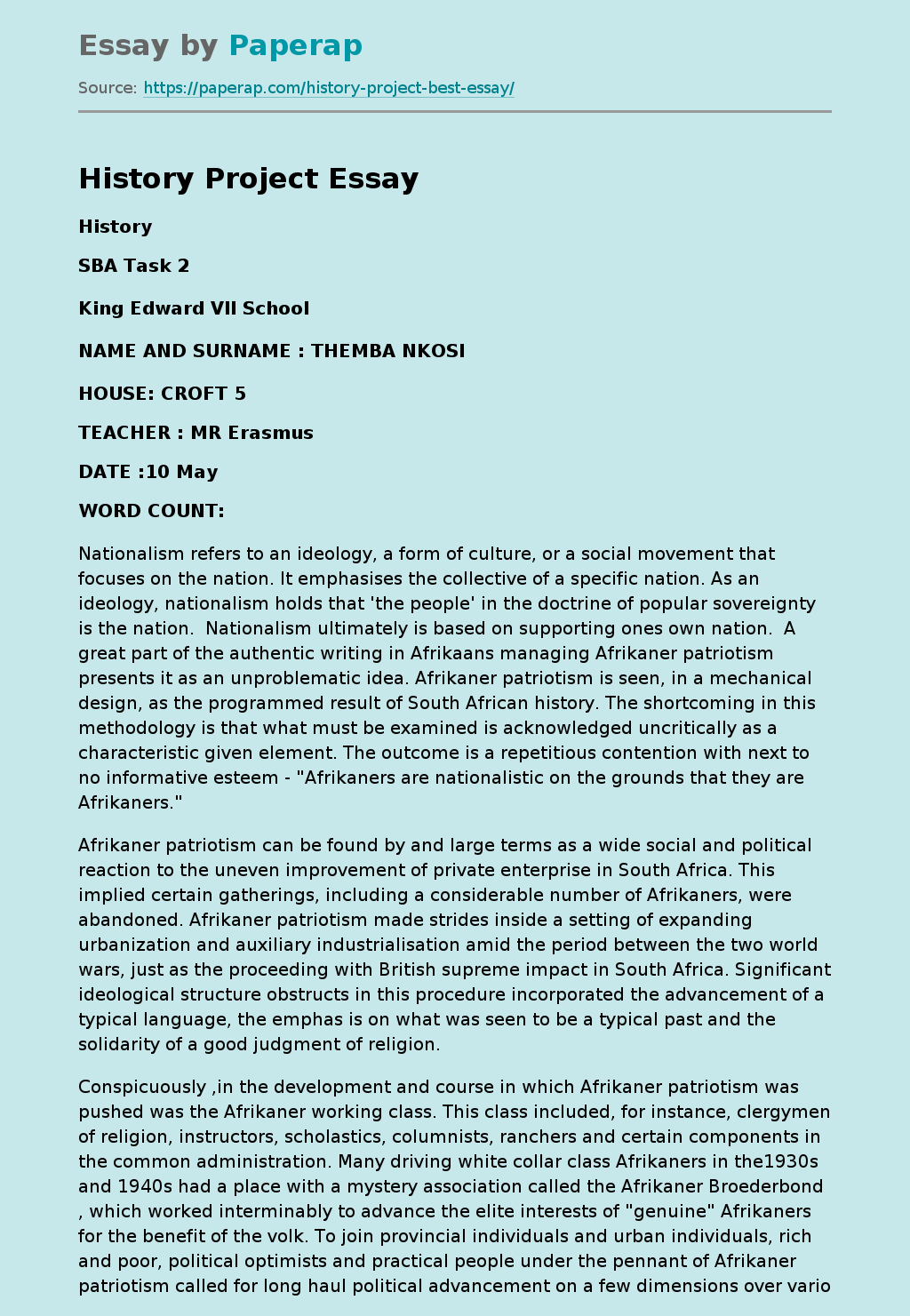History
SBA Task 2
King Edward VII School
NAME AND SURNAME : THEMBA NKOSI
HOUSE: CROFT 5
TEACHER : MR Erasmus
DATE :10 May
WORD COUNT:
Nationalism refers to an ideology, a form of culture, or a social movement that focuses on the nation. It emphasises the collective of a specific nation. As an ideology, nationalism holds that ‘the people’ in the doctrine of popular sovereignty is the nation. Nationalism ultimately is based on supporting ones own nation. A great part of the authentic writing in Afrikaans managing Afrikaner patriotism presents it as an unproblematic idea.
Afrikaner patriotism is seen, in a mechanical design, as the programmed result of South African history. The shortcoming in this methodology is that what must be examined is acknowledged uncritically as a characteristic given element. The outcome is a repetitious contention with next to no informative esteem – “Afrikaners are nationalistic on the grounds that they are Afrikaners.”
Afrikaner patriotism can be found by and large terms as a wide social and political reaction to the uneven improvement of private enterprise in South Africa.
This implied certain gatherings, including a considerable number of Afrikaners, were abandoned. Afrikaner patriotism made strides inside a setting of expanding urbanization and auxiliary industrialisation amid the period between the two world wars, just as the proceeding with British supreme impact in South Africa. Significant ideological structure obstructs in this procedure incorporated the advancement of a typical language, the emphas is on what was seen to be a typical past and the solidarity of a good judgment of religion.
Conspicuously ,in the development and course in which Afrikaner patriotism was pushed was the Afrikaner working class. This class included, for instance, clergymen of religion, instructors, scholastics, columnists, ranchers and certain components in the common administration. Many driving white collar class Afrikaners in the1930s and 1940s had a place with a mystery association called the Afrikaner Broederbond , which worked interminably to advance the elite interests of “genuine” Afrikaners for the benefit of the volk. To join provincial individuals and urban individuals, rich and poor, political optimists and practical people under the pennant of Afrikaner patriotism called for long haul political advancement on a few dimensions over various years.
One association to rise up out of the centennial festivals was the Ossewabrandwag (Oxwagon Sentinel). It advanced itself as a social association, goal on keeping the “soul of 38” alive, yet it can’t be viewed as absolutely social association. It professed to stand unapproachable from the shameful quarrels of gathering governmental issues. Insignificant political contrasts could isolate Afrikanerdom, and subsequently it was felt that the association needed to prepare for such divisions created by the elements of gathering governmental issues.
Given the feelings of certain Afrikaners for the Ossewabrandwagduring the war years, certain creators, reproachful of later Afrikaner race strategies, rushed to compare the post-1948 politically-sanctioned racial segregation state with the Nazi condition of the 1940s. Given the all inclusive analysis stacked upon the Nazis and the general scorne voked by politically-sanctioned racial segregation, the relationship was an enticing one, and one which could be promptly comprehended and acknowledged abroad. Such a coordinated condition, be that as it may, darkens more than it uncovers.
The connection between Afrikaner patriotism and German national communism had all the earmarks of being fundamentally that of common ideological compassion as opposed to profound situated basic similitudes. Afrikaner patriots contrasted from their German partners regarding their faith in the principle of Christian patriotism instead of the unrefined pseudo logical Social Darwinism of the Nazis. Afrikaners wanted to eradicate what they considered the mediocre races, and in spite of the fact that Afrikaners regarded solid leaders, there was no clique of the F*hrer. Afrikaner patriotism owed its attributes and course more to the improvement of explicit indigenous chronicled thoughts, identified with nineteenth-century Boer republican motivations and nearby conditions as showed, than to the appropriation of an unbending belief system which began outside the nation.
History Project. (2019, Nov 25). Retrieved from https://paperap.com/history-project-best-essay/

